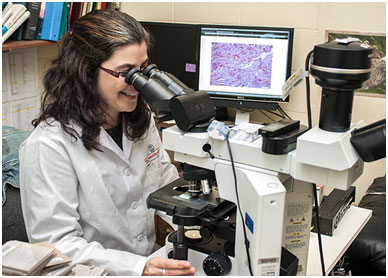Nicole Gottdenker has a BA in Biology from Colgate University, a DVM from Tuskegee University, an MS in Wildlife Ecology and Conservation from the University of Florida, and a PhD in Ecology from the Odum School of Ecology, University of Georgia. She did her pathology residency in wildlife and zoo pathology at the Bronx Zoo/Wildlife Conservation Society. Nicole studies how anthropogenic environmental change influences the transmission ecology of multi-host vector borne pathogens. She also does research in the ecology and pathology of wildlife diseases.
Chagas disease transmission in fragmented forest landscapes
Anthropogenic land use change has been associated with the emergence of vector borne zoonotic pathogens at the landscape scale. Many different ecological processes, driven by land use changes such as deforestation and forest fragmentation, can lead to increased transmission of vector-borne zoonoses. In this study, we evaluate how deforestation and forest fragmentation impacts transmission of Trypanosoma cruzi, the etiologic agent of Chagas disease, a vector-borne zoonosis which is a significant cause of morbidity and mortality throughout Latin America. For the past 10 years, we have been studying impacts of deforestation on palm-tree associated T. cruzi transmission in sylvatic kissing bug vectors of and hosts. Deforestation is associated with increased vector abundance and vector infection prevalence with T. cruzi. Molecular blood meal analysis of vectors caught across deforestation gradients suggests that the loss of mammalian host diversity and a shift towards vector feeding on highly competent wild mammals with ‘r-selected’ life history strategies in deforested landscapes are significant causes of increased vector infection prevalence with T. cruzi in deforested landscapes. Ongoing studies evaluate the impact of food web structure and microclimate on T. cruzi transmission across deforested landscapes, with the goal of identifying potential Chagas disease prevention and control strategies.
